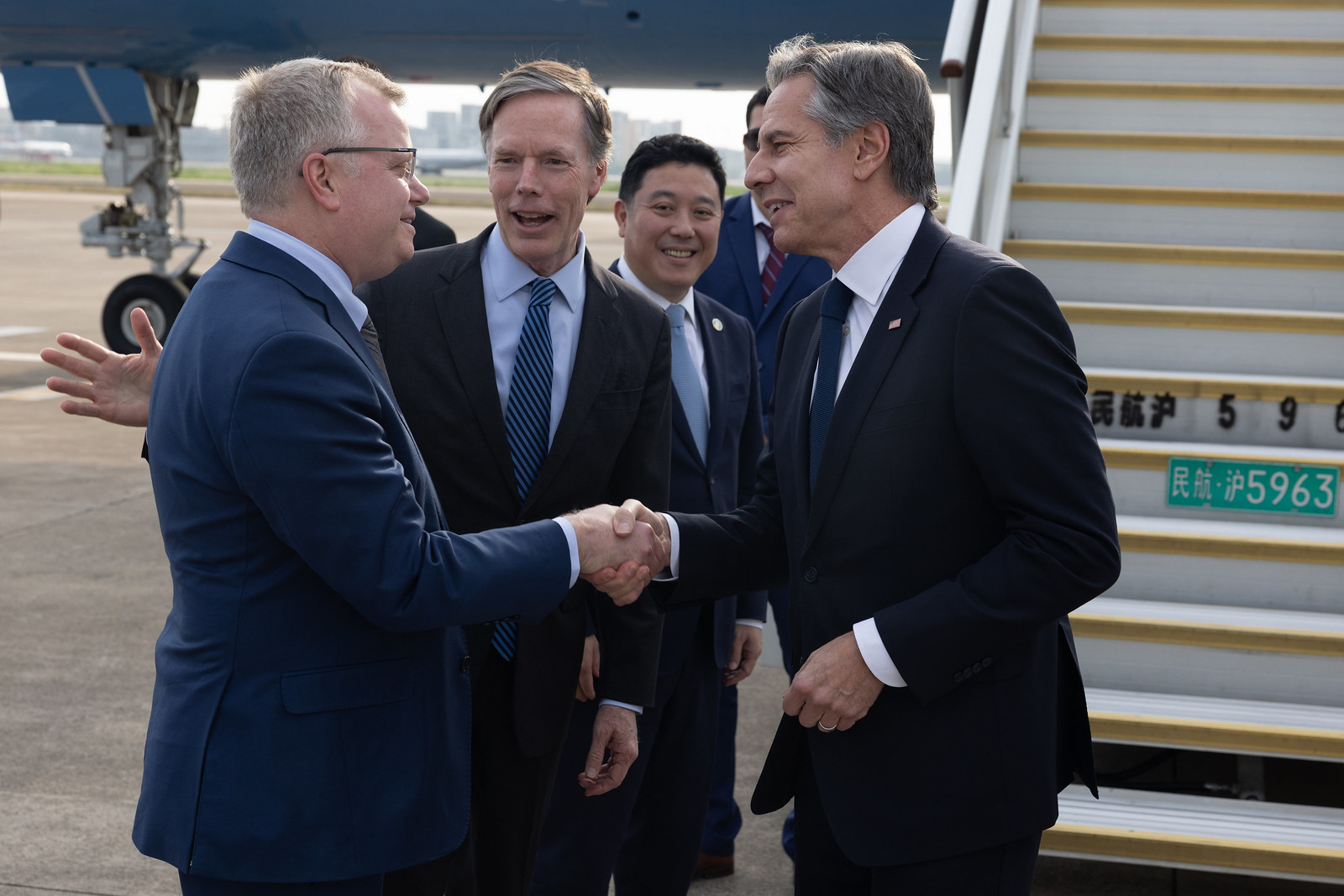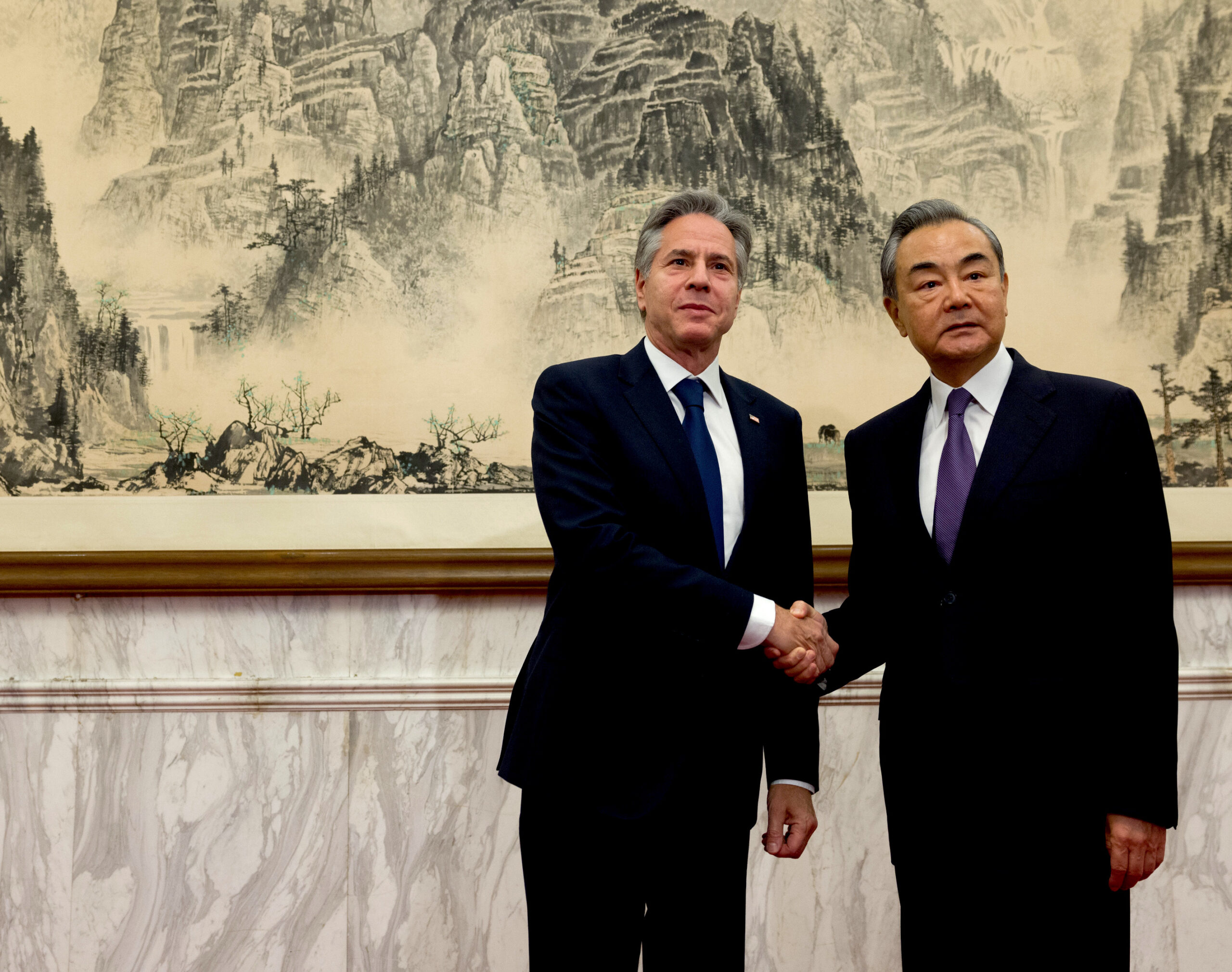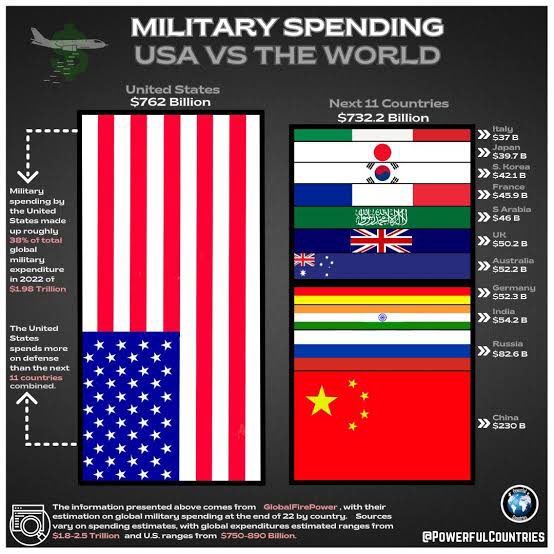April 29, 2024
With the U.S. unable to compete in the EV market and desperate in Ukraine, the Secretary of State traveled to China to talk at Beijing for his domestic audience.

U.S. Secretary of State Antony Blinken waves as he arrives at Shanghai Hongqiao Airport in Shanghai on April 24. (US State Department/Chuck Kennedy)
By Patrick Lawrence
Scheer Post
Antony Blinken was in China for his second such journey as secretary of state and his third encounter with senior Chinese official. This is our news as April marches toward May.
I have to say, it is a stranger state of affairs than I can figure when the State Department and the media that clerk for it told us in advance that America’s top diplomat is going to fail to get anything done as he sets out for the People’s Republic.
“I want to make clear that we are realistic and clear-eyed about the prospects of breakthroughs on any of these issues,” an unnamed State Department official said when briefing reporters last week on Blinken’s agenda. This is how State warns in advance that the secretary will be wasting his time and our money during his encounters in Shanghai and Beijing.
What was this if not an admission of our secretary of state’s diplomatic impotence? Or do I mean incompetence? Or both? This is the man, after all, who arrived in Israel five days after the events of last Oct. 7 to announce, “I come before you as a Jew.” Does this guy understand diplomacy or what?
The media followed the State Department’ lead, naturally, in advising us of the pointlessness of Blinken’s sojourn in China—this at both ends of the Pacific. “Washington is realistic about its expectations on Blinken’s visit in resolving key issues,” said CNBC. “While crucial for keeping lines of communication open, the visit is unlikely to yield major breakthroughs,” the Japan Times commented.
Matt Lee, the very able diplomatic correspondent at The Associated Press (AP), got it righter than anyone in his April 22 report: The point of Blinken’s three days of talks with top Chinese officials, he reported, was to have three days of talks with top Chinese officials. “The mere fact that Blinken is making the trip might be seen by some as encouraging,” Lee wrote, “but ties between Washington and Beijing are tense and the rifts are growing wider.”
This is our Tony. As the record makes pitifully clear, there’s no mileage in predicting success when Blinken boards a plane for the great “out there.” This is unequivocally so in his dealings with the western end of the Pacific.
There is a long list of the topics Blinken was set to raise with Chinese officials, notable among these Foreign Minister Wang Yi. Taiwan and the South China Sea, military-to-military contacts, artificial intelligence applications, illicit drug traffic, human rights, trade: These are standards on the American menu when a U.S. official addresses Chinese counterparts.
The last is especially contentious just now, given the Biden regime’s disgraceful determination to subvert those Chinese industries with which the U.S. cannot compete. With plans to block imports of Chinese-made electric vehicles already afoot, last week President Biden announced new tariffs on imports of Chinese steel.
And it is now “investigating” China’s shipping and shipbuilding industries, which sounds to me like prelude to yet more measures to undermine China’s admirable economic advances.
Nonsensical Times 10

US Secretary of State Antony Blinken is met by Kong Fuan, director general of the Shanghai Foreign Affairs Office (left), ambassador Nicholas Burns and consul general Scott Walker as he arrives at Shanghai Hongqiao Airport. (US State Department/Chuck Kennedy)
But the premier question Blinken addressed has to do with Sino–Russian relations. As he made clear before departing, the secretary of state would more or less insist that the Chinese stop selling various industrial goods to Russia because the U.S. considers them “dual use,” meaning the Russians could use such things as semiconductors in their defense industries—so implicating China in Russia’s military intervention in Ukraine.
Before going any further, let’s try one of those “imagine if” exercises. Imagine if Beijing sent Foreign Minister Wang to Washington to tell the Biden regime to stop supplying weapons to Ukraine as this implicates the U.S. in Ukraine’s war with Russia and this is not on because China and Russia are friends.
It is not even fun, this “imagine if,” so nonsensical is it. Any such exercise would turn Wang, an acutely skilled diplomat, into another Blinken—the thought of which is nonsensical times 10.
But never mind sense and nonsense. Blinken and those who speak for him at State boldly previewed the secretary’s presentation in the days before his departure. Here is Blinken speaking to reporters last Friday:
“We see China sharing machine tools, semiconductors, other dual-use items that have helped Russia rebuild the defense industrial base that sanctions and export controls had done so much to degrade. Now, if China purports on the one hand to want good relations with Europe and other countries, it can’t on the other hand be fueling what is the biggest threat to European security since the end of the Cold War.”
A day later the unnamed State Department official elaborated with this:
“We’re prepared to take steps when we believe necessary against firms that … severely undermine security in both Ukraine and Europe. We’ve demonstrated our willingness to do so regarding firms from a number of countries, not just China. We will express our intent to have China curtail that support.”
As tough diplomatic talk goes, it does not get much tougher. And as dumb diplomacy goes, it does not get much dumber.
For one thing, the Biden regime is demanding that China act against what we can count Beijing’s closest partner—this as leading non–Western nations are coalescing behind a joint project to create a new, let’s call it post–Western world order.
I am reminded of a brilliant tweet someone wrote just after Russia began its Ukraine operation two years ago and the Biden regime sought to recruit Beijing against “Putin’s Russia,” as people such as Blinken insist on referring to the Russian Federation. “Please help us defeat Russia,” the tweet read, “so we can turn our aggression on you when we’re done.” But precisely.
Non-interference Key to Future
For another, the Chinese Foreign Ministry made its response to Blinken’s preposterous intentions clear even before the secretary boarded his plane (and just prior to the passage in the House last week of $60.1 billion in new aid for the Kiev regime).
“It is extremely hypocritical and irresponsible for the U.S. to introduce a large-scale aid bill for Ukraine,” a ministry spokesperson said last week, “while making groundless accusations against normal economic and trade exchanges between China and Russia.”
I cannot think of a handier way of shutting down Antony Blinken.
One other thing while we are on this topic. Among the principles on which a post-Western global order will rest are respect for the sovereignty of all nations and non-interference into the internal affairs of others.
These are two elements of civilized statecraft, as it is destined to be in the 21st century and of which the secretary of state has absolutely no clue.
Why did Secretary Blinken bother to raise this question of Sino–Russian trade when he must have known the response as well as you and I know it. I see two immediate explanations.
One, the crooks in Kiev have already lost Washington’s proxy war with Russia—and goodness knows how much of the just-approved aid they will steal—and Blinken’s presentation in Beijing reflects mounting desperation among the policy cliques who got the U.S. into this hopeless-from-the-start conflict.
Two, and closely related to the above, when Antony Blinken goes to Beijing he does not talk to the Chinese: He talks at them and is not especially concerned about their responses. He is talking only to the American public and the China hawks on Capitol Hill, who have the White House stretching to out-hawk them at every turn.
If you need support for this latter thought, there is Blinken’s assertion last Monday, when introducing the State Department’s annual human rights report, that China is guilty of “genocide and crimes against humanity” against the Uighur population in Xinjiang Province. This charge has been highly suspect since Mike Pompeo, Blinken’s fanatically Sinophobic predecessor at State, conjured it before leaving office in 2021.
Given no charge of genocide has ever been supported with evidence, what in hell was Blinken doing raising this question (1) on the eve of a diplomatic visit to Beijing during which he purported to want other things out of the Chinese, and (2) given his government’s open sponsorship of what we must now call the Israeli–U.S. genocide in Gaza?
Blinken Has Learned Nothing

Antony Blinken and China’s Central Foreign Affairs Office Director Wang Yi meet in Beijing in June last year. (U.S. State Department, Public domain, Wikimedia Commons)
My mind goes back to March 2021 when I read these things. It was then, in an Anchorage hotel (named the Captain Cook) that Blinken and Jake Sullivan, Biden’s new national security adviser, made an utter disaster out of their first encounter with senior Chinese officials, Wang Yi among them.
It was then and there that Blinken and Sullivan, all by themselves, tipped over Sino–U.S. relations with just the sort of shockingly ignorant display of late-imperial presumption Blinken is trying on yet again in Beijing this week.
Sino–American ties have never recovered from the encounter in Anchorage. And Blinken has learned nothing from the mess he made.
Lessons of which there are several. One and as suggested above, a creeping desperation now pervades the Biden regime’s foreign policy cliques. They do not know what to do about Russia and they do not know what to do about China.
Two and related to one, the level of incompetence evident among those directing this administration’s foreign policies is very likely unprecedented in the history of postwar American diplomacy. This now reaches the point it is a danger—most evidently in the cases of China and Russia.
Three, there is no self-awareness among these people. They are not present in their diplomatic encounters—reading, instead, from ideologically driven scripts. Again, three years into the Biden regime this is a clear danger.
Four, last, and by no means least, the Biden regime does not have a China policy.
Think carefully about this. In the single most important relationship the U.S. will have to navigate in the 21st century, those running policy are paralyzed—no map, no diplomatic design, no clear objective other than to oppose, literally, the 21st century in the name of prolonging the 20th.
This is why the warmongers, the economic saboteurs, and the paranoids left over from the “Who lost China?” years remain ascendant in Washington.
Nature abhors a vacuum. So does a foreign policy made of nothing but ignorance and empty bluster. It is the gravest of charges, but Antony Blinken in China makes me feel unsafe.
https://consortiumnews.com/2024/04/29/p ... y-blinken/
Well, I dunno if these clowns are more incompetent than the Trump regimes' ego-manically driven tenure, the only saving grace of which was that it retarded the imperialist program through sheer incompetence. Just compare the body counts...
And that's why I don't think that Trump will be allowed to be prez again, by hook or crook.
******
US Skyrocketing Military Spending Upsets World

The General Frank S Besson carries equipment to build a floating harbour in Gaza, 2024. | Photo: X/ @swilkinsonbc
Published 29 April 2024
With its appetite for global hegemony, Washington continues to fuel chaos around the world.
A recently released report showed that defense spending by the United States -- the world's largest military spender -- accounted for nearly 40 percent of world's total military expenditures in 2023.
In the latest move of aggressive U.S. military spending, President Joe Biden signed a US$95-billion foreign aid bill, which includes more military aid for Ukraine and Israel.
With its skyrocketing military spending and unabated appetite for global hegemony, the United States continues to fuel chaos around the world.

ROCKETING SPENDING
Military spending by the United States rose 2.3 percent to reach US$916 billion in 2023, representing 68 percent of total North Atlantic Treaty Organization (NATO) military spending, according to a Stockholm International Peace Research Institute (SIPRI) report.
Peter G. Peterson Foundation, a nonpartisan organization dedicated to addressing the U.S. long-term fiscal challenges, noted that the U.S. defense spending increased by US$55 billion from 2022 to 2023 in part due to additional military aid for Ukraine.
In the bill newly signed by Biden, more than US$60 billion goes to Ukraine while US$26 billion goes to Israel despite international criticism over the civilian casualties the Israeli army caused in Gaza.
The United States has provided Ukraine with massive military aid especially since the outbreak of the Ukraine crisis, as part of its strategy to counter its strategic rival, Russia.
As Israel's largest military supplier, the United States is complacent in the humanitarian crisis and regional insecurity of the Middle East.
In 2023, most European NATO members increased their military expenditure partly due to the two conflicts, the SIPRI report showed. The total European military spending in 2023 has seen a 16 percent year-on-year increase to US$588 billion.
Estimated military expenditure in the Middle East increased by 9.0 percent to US$200 billion in 2023, the highest annual growth rate in the region seen in the past decade. Israel's military spending grew by 24 percent to reach US$27.5 billion in 2023.
PURSUIT OF HEGEMONY
The SIPRI report showed that the United States spend more on defense than the next nine countries combined. Meanwhile, total military spending by NATO members reached US$1.3 trillion last year, accounting for 55 percent of global military spending.
The United States has decided to "shift its focus away from counterinsurgency operations and asymmetric warfare to developing new weapon systems that could be used in a potential conflict with adversaries with advanced military capabilities," according to the report.
Analysts believe that this shows that the United States is trying to eliminate all potential enemies, which embodies the Cold War mentality and hegemonic thinking.
"Really what American foreign policy is about is promoting American power: ensuring that America remains the hegemonic dominant power of the international system and minimizing any source of threat to America's geopolitical dominance," U.S. political scholar Christopher Layne said in a discussion last year.
Igor Korotchenko, a Russian military expert and the editor-in-chief of National Defense magazine, pointed out that the large number of U.S. military bases and aircraft carrier formations around the world serve its ambition to expand global military influence.
Huge U.S. military spending is not only an important indication of Washington's pursuit of an aggressive foreign policy but a cause of instability and chaos across the world, Korotchenko said.
Washington's attempt to maintain global hegemony by trying to divide the world is "a strategy that is very dangerous and misguided," said Jeffrey Sachs, economics professor at Columbia University.
WIN OR LOSE
The United States' enormous military expenditure and ongoing provision of foreign military aid clearly show its priorities. In the newly released first quarter financial results, U.S. military giant Raytheon saw sales of US$19.3 billion, up 12 percent from a year earlier, and net income of US$1.7 billion, up 20 percent from a year earlier, which both beat expectations.
Raytheon's order backlog is a record US$202 billion, with massive orders in the defense and commercial aerospace sectors, reflecting strong revenue potential in the future.
Lockheed Martin, meanwhile, reported first-quarter sales of US$17.2 billion , up 14 percent from a year earlier. The recent passage of the foreign aid bill may increase orders for F-35 fighter jets, which could mean additional revenue for Lockheed Martin, reported Bloomberg.
"It's past time to break the grip that the U.S. military-industrial complex has on our politics, policy, and collective thinking. For the military-industrial complex, no amount is too much to spend on Pentagon contractors," Robert Weissman, president of Public Citizen, a nonprofit consumer advocacy organization headquartered in Washington. D.C., said in a statement earlier this week.
"For those of us in the real world, a dollar spent on killing machines is a dollar that we can't spend on daycare, expanding Medicare, or other human priorities," said Weissman.
A growing number of Americans are discontented with the continued consumption of national resources by the military-industrial complex, while crucial areas of people's livelihood receive insufficient attention.
Earlier in April, people held a rally protesting America's defense policies in Renton, a city in the northwestern U.S. State of Washington, according to a report by Renton Reporter.
"I would like to see the money being spent on the military being spent on healthcare, education, saving the planet, transportation, light rail, bicycle infrastructure, and things like that. Good things for human beings," Mona Lee, 85, who led the protest.
https://www.telesurenglish.net/news/US- ... -0002.html
*******